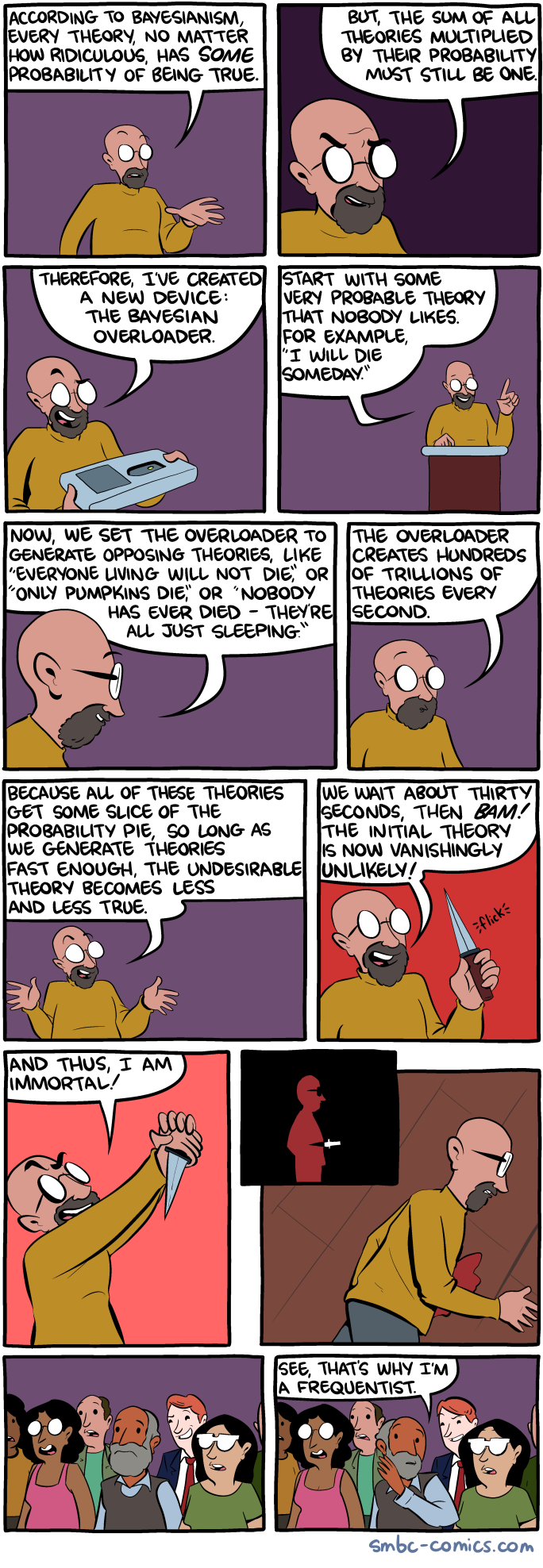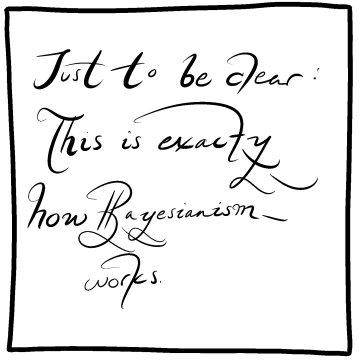Bayesianism: Difference between revisions
OpenBagTwo (talk | contribs) m (ESA spotted) |
(Added brief description of the fallacies presented.) |
||
| Line 8: | Line 8: | ||
}} | }} | ||
==Explanation== | ==Explanation== | ||
{{ | The speaker is misunderstanding {{w|Bayesian probability|Bayesian probability}}, an interpretation of probability as a measure of personal belief. He points out that one can make arbitrarily many (and in fact, infinitely many) competing theories to any given theory, and thus fallaciously concludes that this implies each theory has arbitrarily small probability (including, in this case, the undesirable theory that he will die). There are several fallacies here: First and foremost, he is assuming that his subjective probability actually reflects reality - approximately described by the concept of a {w|Calibrated probability assessment|calibrated probability}. The second fallacy is that all unknown options are equally likely - namely that each competing theory must take up some non-trivial fraction of the total probability. To see this is fallacious, consider the collection of hypotheses "In exactly x seconds, I will gain an invincibility cloak" for each positive real number x. Since there are uncountably many of these hypotheses, it is not possible for all of them to have non-zero probability. Lastly, it is not true that a Bayesian believes that every event has positive probability - it simply means that if an event that they a priori believe to be impossible happens, it would not change their belief about this event. | ||
A similar concept to this is expressed in the {{w|Simulation hypothesis|Simulation hypothesis}}, although there whether it is fallacious is highly disputed. | |||
==Transcript== | ==Transcript== | ||
:[A speaker on stage lecturing] | |||
:[ | :According to Bayesianism, every theory, no matter how ridiculous, has some probability of being true. | ||
: | :But the sum of all theories multiplied by their probability must still be one. | ||
: | :Therefore, I've created a new device: The Bayesian overloader. | ||
:Therefore, I've created a new device: The | :Start with some very probable theory that nobody likes. For example, "I will die someday". | ||
:Start with some very probable theory that nobody likes. For example, " | :Now we set the overloader to generate opposing theories, like "Everyone living will not die", or "Only pumpkins die", or "Nobody has ever died - they're all just sleeping". | ||
:Now | :The overloader creates hundred of trillions of theories every second. | ||
:The overloader creates | :Because all of these theories get some slice of the probability pie, so long as we generate theories fast enough, the undesireable theory becomes less and less true. | ||
:Because all of these theories get some slice of the probability pie, so long as we generate theories fast enough, the | :We wait about thirty seconds, then BAM! The initial theory is now vanishingly unlikely! [Flicks knife] | ||
:We wait about thirty seconds, then | :And thus I am immortal! | ||
:And thus | :[Stabs self, falls over dead] | ||
:[Crowd murmurs] | |||
:See, that's why I'm a frequentist. | |||
==Votey Transcript== | ==Votey Transcript== | ||
:[Cursive] | |||
:[ | :Just to be clear: This is exactly how Bayesianism works. | ||
:Just to be | |||
{{comic discussion}} | {{comic discussion}} | ||
[[Category:Comics featuring Excited Symposium Attender]] | [[Category:Comics featuring Excited Symposium Attender]] | ||
Revision as of 14:41, 16 September 2024
| bayesianism |
 Title text: I'm just realizing the Venn diagram for people who know the reference and people who like the joke is a null set. |
Votey
Explanation
The speaker is misunderstanding Bayesian probability, an interpretation of probability as a measure of personal belief. He points out that one can make arbitrarily many (and in fact, infinitely many) competing theories to any given theory, and thus fallaciously concludes that this implies each theory has arbitrarily small probability (including, in this case, the undesirable theory that he will die). There are several fallacies here: First and foremost, he is assuming that his subjective probability actually reflects reality - approximately described by the concept of a {w|Calibrated probability assessment|calibrated probability}. The second fallacy is that all unknown options are equally likely - namely that each competing theory must take up some non-trivial fraction of the total probability. To see this is fallacious, consider the collection of hypotheses "In exactly x seconds, I will gain an invincibility cloak" for each positive real number x. Since there are uncountably many of these hypotheses, it is not possible for all of them to have non-zero probability. Lastly, it is not true that a Bayesian believes that every event has positive probability - it simply means that if an event that they a priori believe to be impossible happens, it would not change their belief about this event.
A similar concept to this is expressed in the Simulation hypothesis, although there whether it is fallacious is highly disputed.
Transcript
- [A speaker on stage lecturing]
- According to Bayesianism, every theory, no matter how ridiculous, has some probability of being true.
- But the sum of all theories multiplied by their probability must still be one.
- Therefore, I've created a new device: The Bayesian overloader.
- Start with some very probable theory that nobody likes. For example, "I will die someday".
- Now we set the overloader to generate opposing theories, like "Everyone living will not die", or "Only pumpkins die", or "Nobody has ever died - they're all just sleeping".
- The overloader creates hundred of trillions of theories every second.
- Because all of these theories get some slice of the probability pie, so long as we generate theories fast enough, the undesireable theory becomes less and less true.
- We wait about thirty seconds, then BAM! The initial theory is now vanishingly unlikely! [Flicks knife]
- And thus I am immortal!
- [Stabs self, falls over dead]
- [Crowd murmurs]
- See, that's why I'm a frequentist.
Votey Transcript
- [Cursive]
- Just to be clear: This is exactly how Bayesianism works.
![]() add a comment! ⋅
add a comment! ⋅ ![]() add a topic (use sparingly)! ⋅
add a topic (use sparingly)! ⋅ ![]() refresh comments!
refresh comments!
Discussion
No comments yet!
